The Reformation: Examining Early Modern Christian Belief Systems
VerifiedAdded on 2023/06/11
|5
|1086
|110
Essay
AI Summary
This essay examines the evolution of Christian beliefs during the Early Modern period, focusing on the impact of the Reformation and subsequent philosophical movements. It discusses how early modern religious belief in a Christian God, initially rooted in the Catholic Church, faced radical changes due to philosophers challenging Christian doctrines. The rise of individualism, the emphasis on human reason, and the skepticism towards miracles led to a re-evaluation of Christian beliefs. The essay further explores the influence of Karl Marx's materialism, Liberal Protestantism, and the theory of evolution on Christian theology. It also addresses the Roman Catholic Church's response to these challenges, particularly through the works of Hans Urs von Balthasar and Karl Rahner, and the reaffirmation of core doctrines in the Catechism of the Catholic Church. The analysis concludes that while these theories impacted life in different perspectives, they also caused harm to believers by increasing doubt and questioning traditional Christian beliefs.
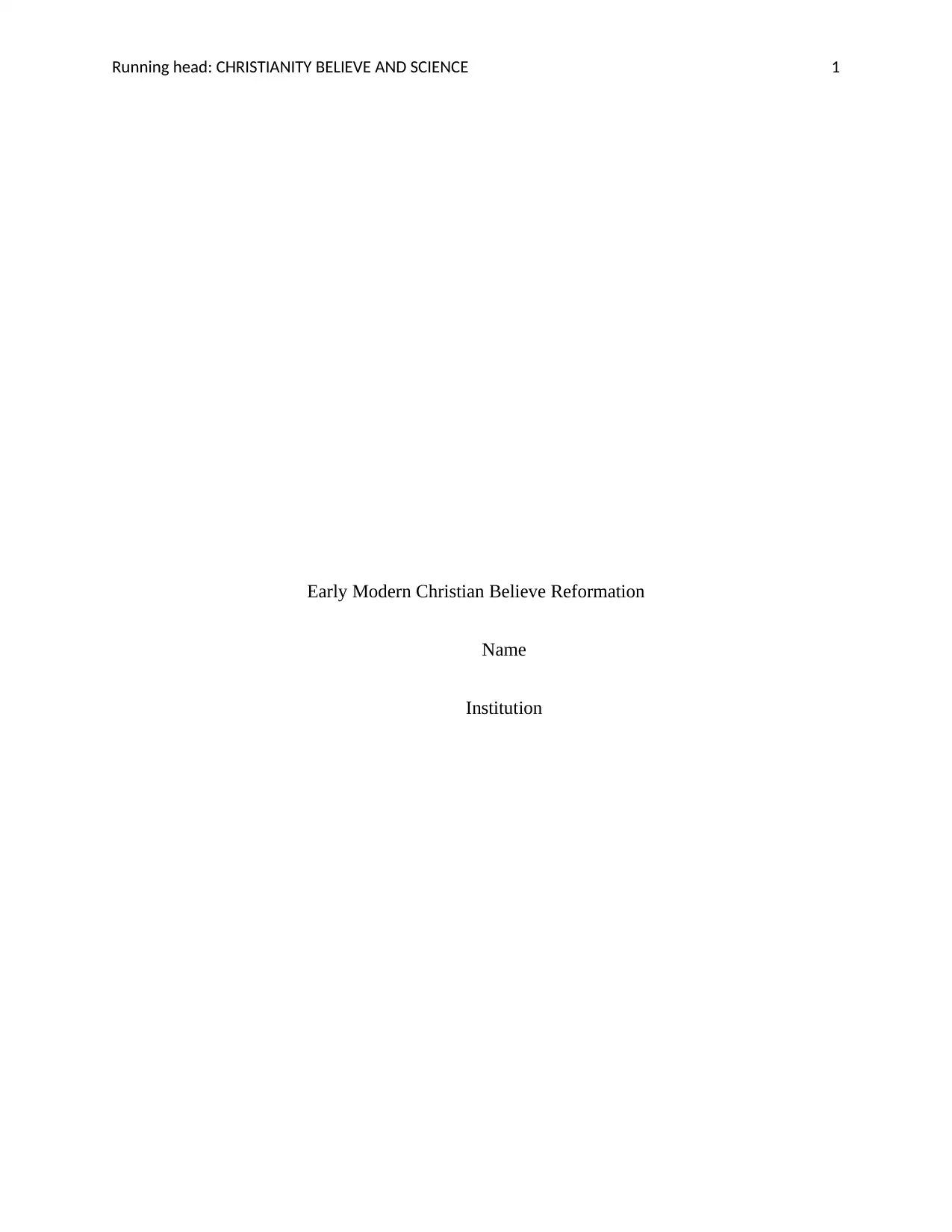
Running head: CHRISTIANITY BELIEVE AND SCIENCE 1
Early Modern Christian Believe Reformation
Name
Institution
Early Modern Christian Believe Reformation
Name
Institution
Paraphrase This Document
Need a fresh take? Get an instant paraphrase of this document with our AI Paraphraser
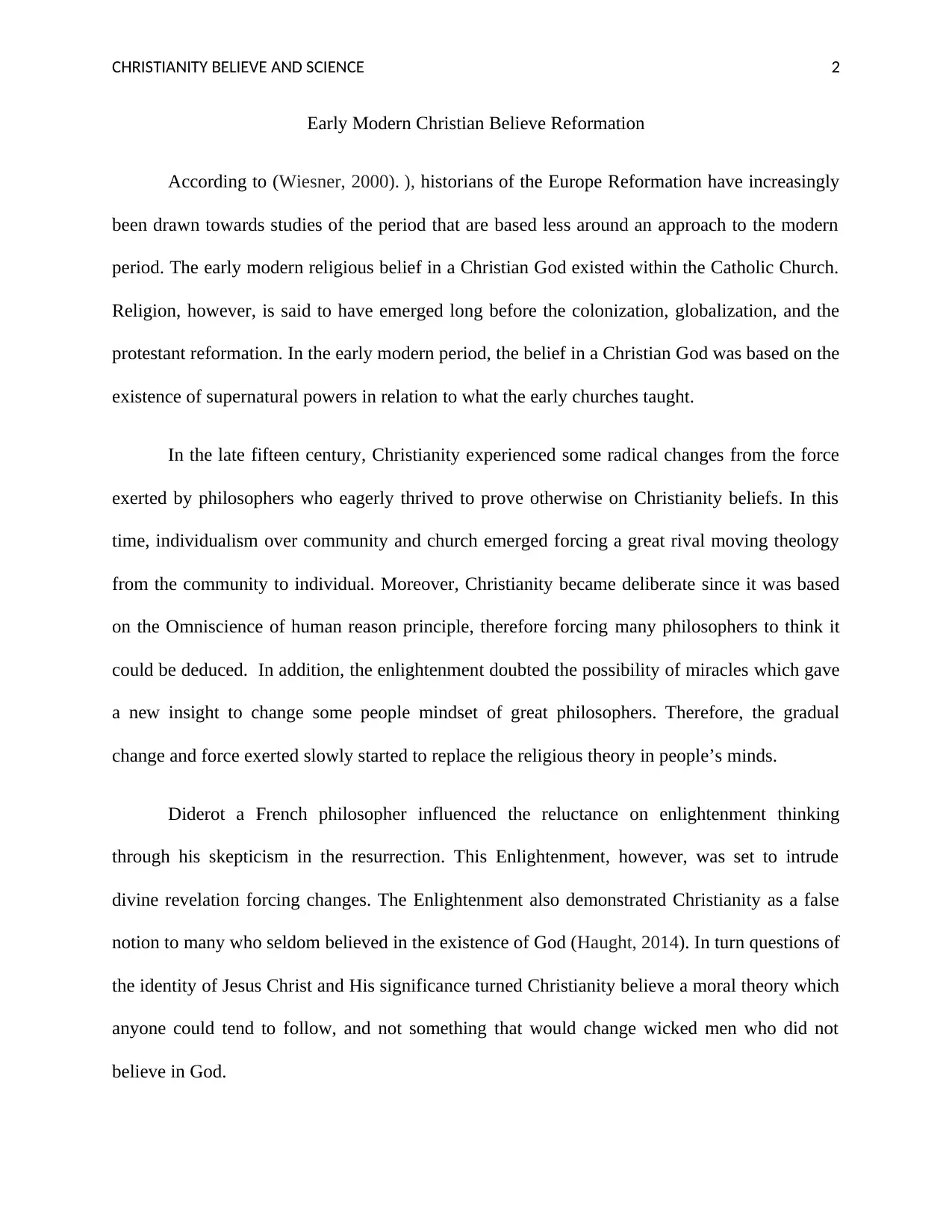
CHRISTIANITY BELIEVE AND SCIENCE 2
Early Modern Christian Believe Reformation
According to (Wiesner, 2000). ), historians of the Europe Reformation have increasingly
been drawn towards studies of the period that are based less around an approach to the modern
period. The early modern religious belief in a Christian God existed within the Catholic Church.
Religion, however, is said to have emerged long before the colonization, globalization, and the
protestant reformation. In the early modern period, the belief in a Christian God was based on the
existence of supernatural powers in relation to what the early churches taught.
In the late fifteen century, Christianity experienced some radical changes from the force
exerted by philosophers who eagerly thrived to prove otherwise on Christianity beliefs. In this
time, individualism over community and church emerged forcing a great rival moving theology
from the community to individual. Moreover, Christianity became deliberate since it was based
on the Omniscience of human reason principle, therefore forcing many philosophers to think it
could be deduced. In addition, the enlightenment doubted the possibility of miracles which gave
a new insight to change some people mindset of great philosophers. Therefore, the gradual
change and force exerted slowly started to replace the religious theory in people’s minds.
Diderot a French philosopher influenced the reluctance on enlightenment thinking
through his skepticism in the resurrection. This Enlightenment, however, was set to intrude
divine revelation forcing changes. The Enlightenment also demonstrated Christianity as a false
notion to many who seldom believed in the existence of God (Haught, 2014). In turn questions of
the identity of Jesus Christ and His significance turned Christianity believe a moral theory which
anyone could tend to follow, and not something that would change wicked men who did not
believe in God.
Early Modern Christian Believe Reformation
According to (Wiesner, 2000). ), historians of the Europe Reformation have increasingly
been drawn towards studies of the period that are based less around an approach to the modern
period. The early modern religious belief in a Christian God existed within the Catholic Church.
Religion, however, is said to have emerged long before the colonization, globalization, and the
protestant reformation. In the early modern period, the belief in a Christian God was based on the
existence of supernatural powers in relation to what the early churches taught.
In the late fifteen century, Christianity experienced some radical changes from the force
exerted by philosophers who eagerly thrived to prove otherwise on Christianity beliefs. In this
time, individualism over community and church emerged forcing a great rival moving theology
from the community to individual. Moreover, Christianity became deliberate since it was based
on the Omniscience of human reason principle, therefore forcing many philosophers to think it
could be deduced. In addition, the enlightenment doubted the possibility of miracles which gave
a new insight to change some people mindset of great philosophers. Therefore, the gradual
change and force exerted slowly started to replace the religious theory in people’s minds.
Diderot a French philosopher influenced the reluctance on enlightenment thinking
through his skepticism in the resurrection. This Enlightenment, however, was set to intrude
divine revelation forcing changes. The Enlightenment also demonstrated Christianity as a false
notion to many who seldom believed in the existence of God (Haught, 2014). In turn questions of
the identity of Jesus Christ and His significance turned Christianity believe a moral theory which
anyone could tend to follow, and not something that would change wicked men who did not
believe in God.
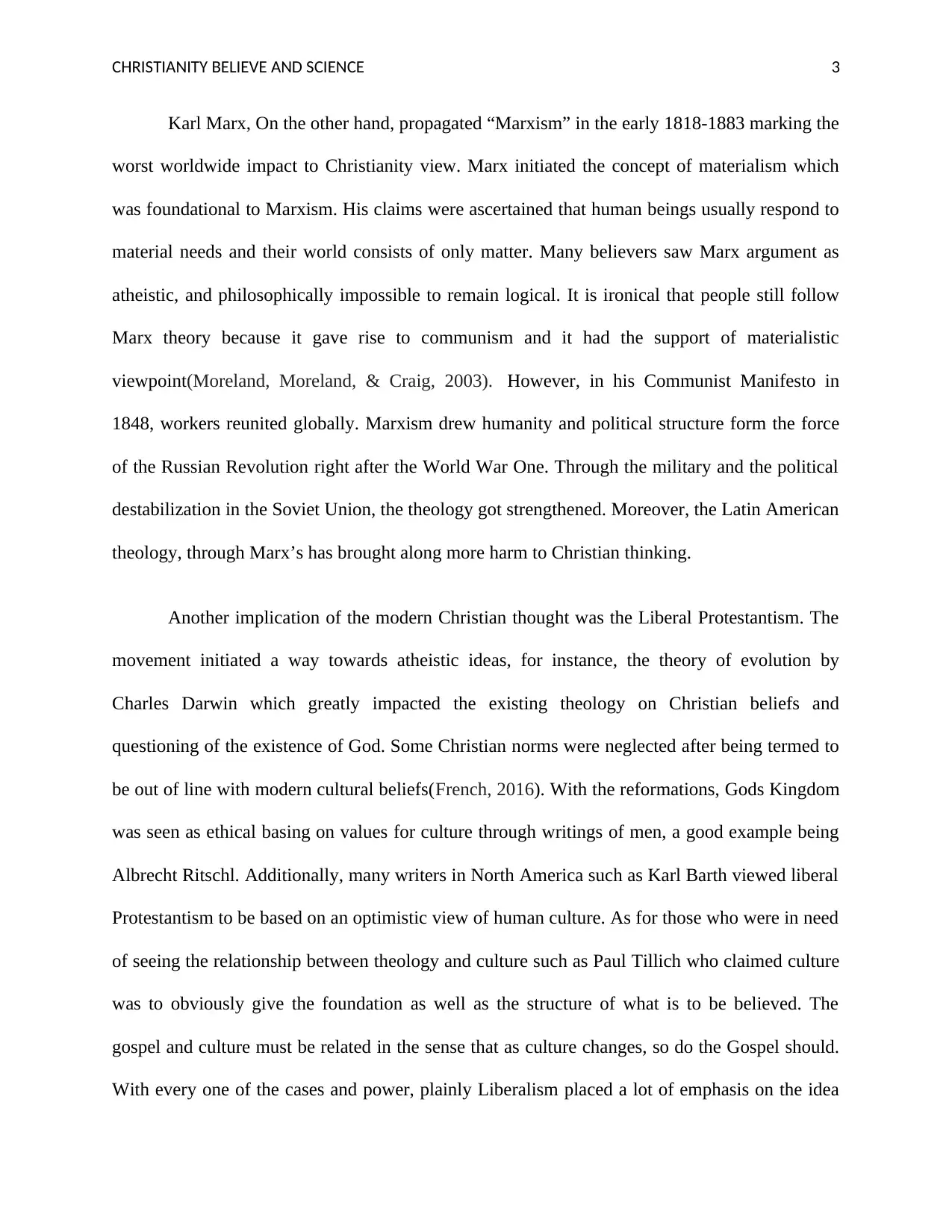
CHRISTIANITY BELIEVE AND SCIENCE 3
Karl Marx, On the other hand, propagated “Marxism” in the early 1818-1883 marking the
worst worldwide impact to Christianity view. Marx initiated the concept of materialism which
was foundational to Marxism. His claims were ascertained that human beings usually respond to
material needs and their world consists of only matter. Many believers saw Marx argument as
atheistic, and philosophically impossible to remain logical. It is ironical that people still follow
Marx theory because it gave rise to communism and it had the support of materialistic
viewpoint(Moreland, Moreland, & Craig, 2003). However, in his Communist Manifesto in
1848, workers reunited globally. Marxism drew humanity and political structure form the force
of the Russian Revolution right after the World War One. Through the military and the political
destabilization in the Soviet Union, the theology got strengthened. Moreover, the Latin American
theology, through Marx’s has brought along more harm to Christian thinking.
Another implication of the modern Christian thought was the Liberal Protestantism. The
movement initiated a way towards atheistic ideas, for instance, the theory of evolution by
Charles Darwin which greatly impacted the existing theology on Christian beliefs and
questioning of the existence of God. Some Christian norms were neglected after being termed to
be out of line with modern cultural beliefs(French, 2016). With the reformations, Gods Kingdom
was seen as ethical basing on values for culture through writings of men, a good example being
Albrecht Ritschl. Additionally, many writers in North America such as Karl Barth viewed liberal
Protestantism to be based on an optimistic view of human culture. As for those who were in need
of seeing the relationship between theology and culture such as Paul Tillich who claimed culture
was to obviously give the foundation as well as the structure of what is to be believed. The
gospel and culture must be related in the sense that as culture changes, so do the Gospel should.
With every one of the cases and power, plainly Liberalism placed a lot of emphasis on the idea
Karl Marx, On the other hand, propagated “Marxism” in the early 1818-1883 marking the
worst worldwide impact to Christianity view. Marx initiated the concept of materialism which
was foundational to Marxism. His claims were ascertained that human beings usually respond to
material needs and their world consists of only matter. Many believers saw Marx argument as
atheistic, and philosophically impossible to remain logical. It is ironical that people still follow
Marx theory because it gave rise to communism and it had the support of materialistic
viewpoint(Moreland, Moreland, & Craig, 2003). However, in his Communist Manifesto in
1848, workers reunited globally. Marxism drew humanity and political structure form the force
of the Russian Revolution right after the World War One. Through the military and the political
destabilization in the Soviet Union, the theology got strengthened. Moreover, the Latin American
theology, through Marx’s has brought along more harm to Christian thinking.
Another implication of the modern Christian thought was the Liberal Protestantism. The
movement initiated a way towards atheistic ideas, for instance, the theory of evolution by
Charles Darwin which greatly impacted the existing theology on Christian beliefs and
questioning of the existence of God. Some Christian norms were neglected after being termed to
be out of line with modern cultural beliefs(French, 2016). With the reformations, Gods Kingdom
was seen as ethical basing on values for culture through writings of men, a good example being
Albrecht Ritschl. Additionally, many writers in North America such as Karl Barth viewed liberal
Protestantism to be based on an optimistic view of human culture. As for those who were in need
of seeing the relationship between theology and culture such as Paul Tillich who claimed culture
was to obviously give the foundation as well as the structure of what is to be believed. The
gospel and culture must be related in the sense that as culture changes, so do the Gospel should.
With every one of the cases and power, plainly Liberalism placed a lot of emphasis on the idea
⊘ This is a preview!⊘
Do you want full access?
Subscribe today to unlock all pages.

Trusted by 1+ million students worldwide
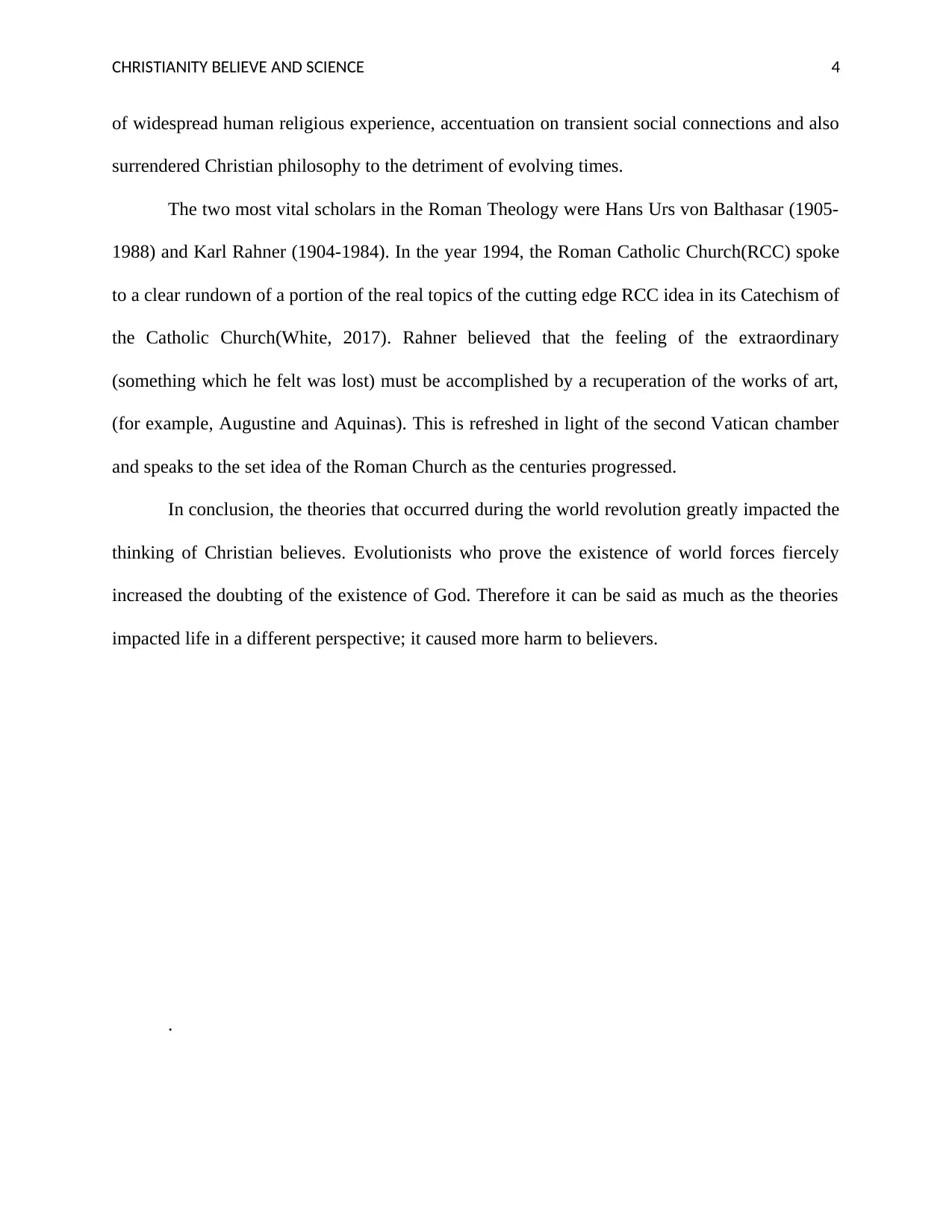
CHRISTIANITY BELIEVE AND SCIENCE 4
of widespread human religious experience, accentuation on transient social connections and also
surrendered Christian philosophy to the detriment of evolving times.
The two most vital scholars in the Roman Theology were Hans Urs von Balthasar (1905-
1988) and Karl Rahner (1904-1984). In the year 1994, the Roman Catholic Church(RCC) spoke
to a clear rundown of a portion of the real topics of the cutting edge RCC idea in its Catechism of
the Catholic Church(White, 2017). Rahner believed that the feeling of the extraordinary
(something which he felt was lost) must be accomplished by a recuperation of the works of art,
(for example, Augustine and Aquinas). This is refreshed in light of the second Vatican chamber
and speaks to the set idea of the Roman Church as the centuries progressed.
In conclusion, the theories that occurred during the world revolution greatly impacted the
thinking of Christian believes. Evolutionists who prove the existence of world forces fiercely
increased the doubting of the existence of God. Therefore it can be said as much as the theories
impacted life in a different perspective; it caused more harm to believers.
.
of widespread human religious experience, accentuation on transient social connections and also
surrendered Christian philosophy to the detriment of evolving times.
The two most vital scholars in the Roman Theology were Hans Urs von Balthasar (1905-
1988) and Karl Rahner (1904-1984). In the year 1994, the Roman Catholic Church(RCC) spoke
to a clear rundown of a portion of the real topics of the cutting edge RCC idea in its Catechism of
the Catholic Church(White, 2017). Rahner believed that the feeling of the extraordinary
(something which he felt was lost) must be accomplished by a recuperation of the works of art,
(for example, Augustine and Aquinas). This is refreshed in light of the second Vatican chamber
and speaks to the set idea of the Roman Church as the centuries progressed.
In conclusion, the theories that occurred during the world revolution greatly impacted the
thinking of Christian believes. Evolutionists who prove the existence of world forces fiercely
increased the doubting of the existence of God. Therefore it can be said as much as the theories
impacted life in a different perspective; it caused more harm to believers.
.
Paraphrase This Document
Need a fresh take? Get an instant paraphrase of this document with our AI Paraphraser
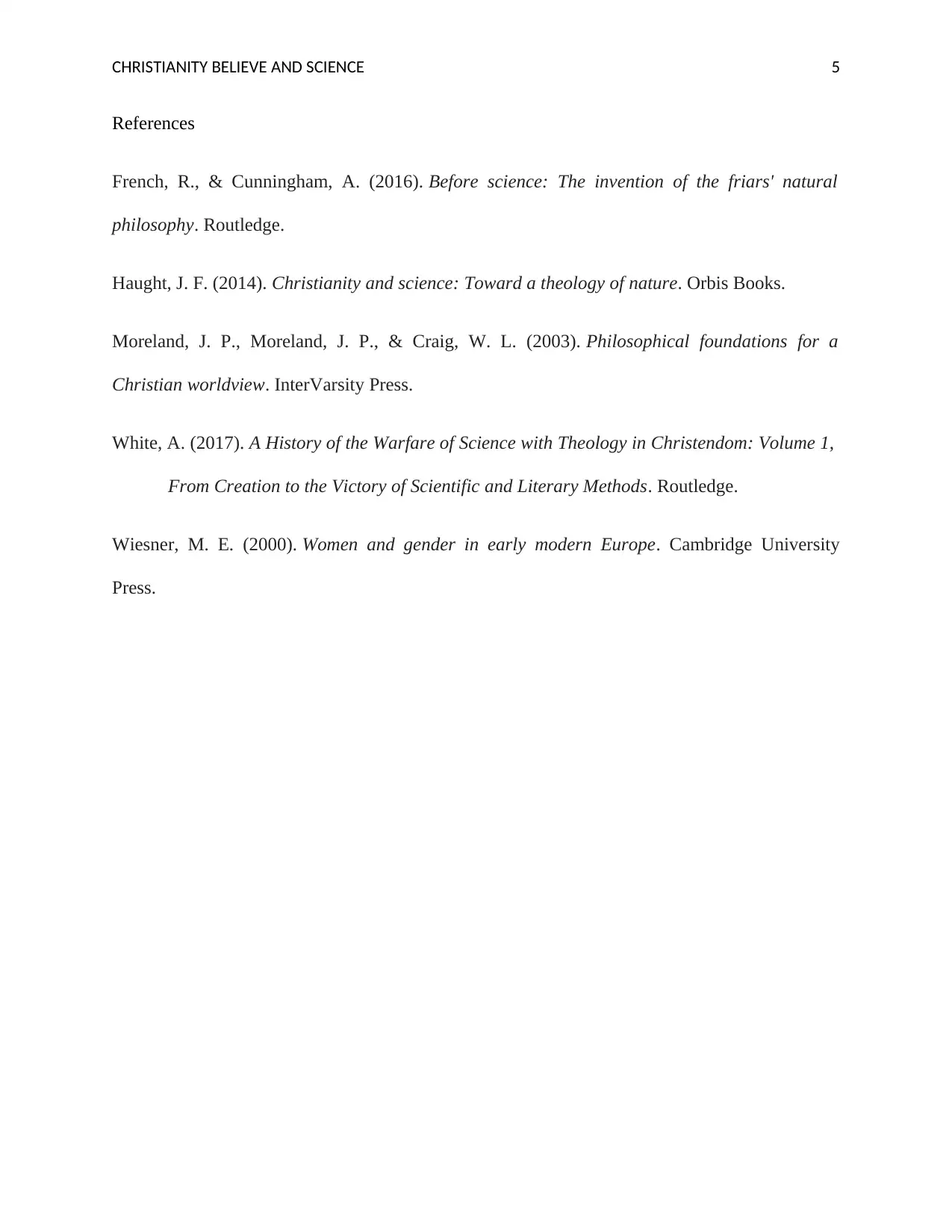
CHRISTIANITY BELIEVE AND SCIENCE 5
References
French, R., & Cunningham, A. (2016). Before science: The invention of the friars' natural
philosophy. Routledge.
Haught, J. F. (2014). Christianity and science: Toward a theology of nature. Orbis Books.
Moreland, J. P., Moreland, J. P., & Craig, W. L. (2003). Philosophical foundations for a
Christian worldview. InterVarsity Press.
White, A. (2017). A History of the Warfare of Science with Theology in Christendom: Volume 1,
From Creation to the Victory of Scientific and Literary Methods. Routledge.
Wiesner, M. E. (2000). Women and gender in early modern Europe. Cambridge University
Press.
References
French, R., & Cunningham, A. (2016). Before science: The invention of the friars' natural
philosophy. Routledge.
Haught, J. F. (2014). Christianity and science: Toward a theology of nature. Orbis Books.
Moreland, J. P., Moreland, J. P., & Craig, W. L. (2003). Philosophical foundations for a
Christian worldview. InterVarsity Press.
White, A. (2017). A History of the Warfare of Science with Theology in Christendom: Volume 1,
From Creation to the Victory of Scientific and Literary Methods. Routledge.
Wiesner, M. E. (2000). Women and gender in early modern Europe. Cambridge University
Press.
1 out of 5
Related Documents
Your All-in-One AI-Powered Toolkit for Academic Success.
+13062052269
info@desklib.com
Available 24*7 on WhatsApp / Email
![[object Object]](/_next/static/media/star-bottom.7253800d.svg)
Unlock your academic potential
Copyright © 2020–2026 A2Z Services. All Rights Reserved. Developed and managed by ZUCOL.




![Origin Stories and Destiny: Religious Studies at [University Name]](/_next/image/?url=https%3A%2F%2Fdesklib.com%2Fmedia%2Forigin-stories-destiny-theology_page_1.jpg&w=256&q=75)